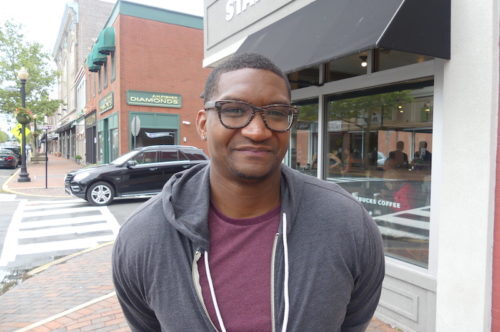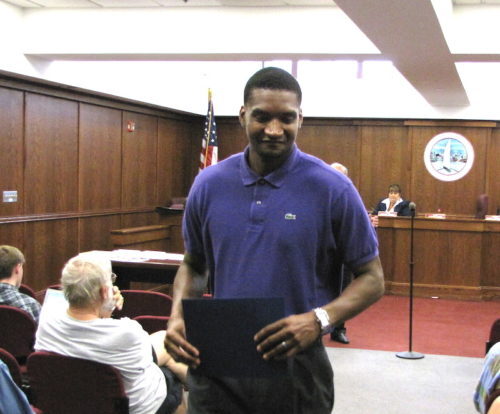
By JOHN T. WARD

Completing a loop of sorts, Julius Clark returns to the area where he worked for 13 before departing for what turned out to be a one-year stay at a district in Mercer County.

Clark, 36, son of a military father, grew up in California, Ohio and Texas before bouncing around New Jersey starting in his teens: Bayonne, Plainsboro, Brick, Trenton. He now lives in Toms River with his wife and two children, ages four and two.
Fresh out of The College of New Jersey in 2005, Clark came to Red Bank, where he worked for nine years as a math teacher and four years as an assistant principal, all at the middle school. There, he credits former fellow teacher Pam Brett with helping him develop his “philosophy of mathematics.”
He holds a master’s from Fairleigh Dickinson University, where he also obtained his principal’s certification.
Clark left Red Bank for the 2018-2019 school year to take an assistant principal position at the Community Middle School in the West Windsor-Plainsboro district. The RBR board of ed approved his hiring as the successor to retired principal Risa Clay at its June 19 session.
Here’s a lightly condensed interview redbankgreen conducted with Clark over coffee on Broad Street in downtown Red Bank in July.
What is your philosophy of mathematics?
It’s about making kids not afraid to take risks, not afraid to get a wrong answer, and exposing them to multiple ways to solve a problem, so they can develop some kind of strategy to answer a question. There’s not one-way model. I believe if you allow kids to explore and ask questions, they’ll develop their own strategies for solving problems.
Math is not a genetic thing: you’re not born good at doing math. That’s been proven. And I think we have to get that mindset out of us, everyone, because we’ve been told you have to have math mind. No. You just have to be shown different.
Why did you leave Red Bank for West Windsor?
I needed to try something different. Red Bank was all I knew. I never thought I would come back, necessarily.
Over my first year, I learned a lot, worked with a lot of great people, and whether I had gotten the job with Red Bank Regional or not, I was happy in West Windsor, and know I would have grown a lot if I stayed. But now I’m onto a different chapter.
It’s been a blessing to be hired as the principal, and it’s going to be a challenge, but it’s a challenge I welcome.
Well, you’ll know some people.
Yes, I know the superintendent [Louis Moore], some of the supervisors, I know some of the teachers. I did the Summer Slam program at Red Bank Regional High School for a few years for incoming freshman, some of them kids I taught at Red Bank Middle School, as well as Little Silver and Shrewsbury kids, to help them acclimate to high school.
I tried to build relationships. I’m big on that. I think relationship-building starts there – with other kids, with adults, whatever. It’s purposeful group work. Sometimes teachers say, “go work together in a group,” but we don’t necessarily teach the kids how to work together in a group. So I would teach into it, how to work together. It takes time.
What did you think when the principal’s job at RBR became open?
I was a little hesitant because it was a high school thing, and I have a middle school background. But I talked to people in education, administrators. My stepmom’s a former principal in Hamilton – she did high school and elementary. Talking to her, and other admin people I know, they said, “listen, leading is leading. If you know how to be a genuine person, how to lead and inspire, that’s what the job is.”
Historically, the principal in a high school has been depicted in movies as the heavy, the person a student was sent to when they got in trouble. How accurate is that today?
Really, whoever’s in there, the role is what they make of it. Historically, the assistant principal is in charge of discipline, and the principal I see as in charge of establishing the overall culture: What does the school want to be known for, what’s the vision? That, and to empower others to be their best self, whether it’s supervisors, teachers, kids. We want them to be their best self.
This sounds like an echo of Superintendent Jared Rumage‘s approach in the Red Bank district.
Yeah, he’s been a big influence in my life, as a leader, as a mentor. He and [primary school principal] Maria Iozzi have really helped mold me as a leader. Sometimes he was tough on me, but you need that, because from that toughness, that’s where I learned.
Your predecessor as principal, Risa Clay, was lauded at a recent council meeting for, among other things, the many miles she clocked on foot each day just going from one part of the school to another. Will you be doing that?
Absolutely. You have to be showing face. The teachers have to see you, the kids have to see you. That’s how you get the pulse of the building. And a lot of times, you can put out fires before they even start just by being out and about.
Is there a particularly large challenge you expect to face in your new job?
The challenge is you’re meeting new people and you’re learning the ways of a high school, the culture of the school. I can’t just jump: I’ve got to build relationships. Of course, I have some ideas, but you need perspective first, teacher perspectives, student perspectives, before your start sharing your thoughts and ideas.





















